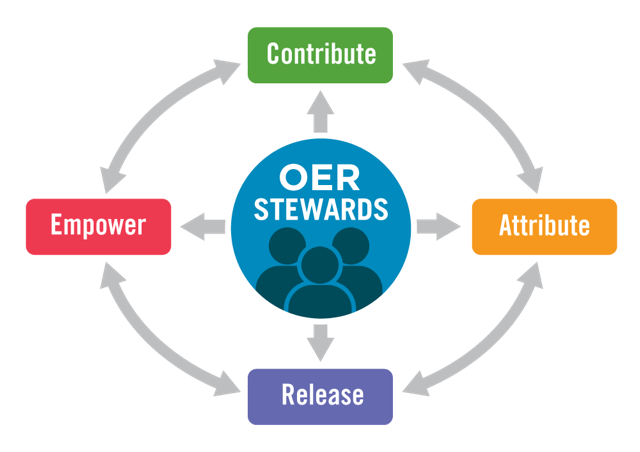The CARE Framework
The purpose of the CARE Framework is to articulate a set of shared values and a collective vision for the future of education and learning enabled by the widespread adoption and use of OER. It aims to address the question of how an individual, institution, or organization, seeking to be a good steward, can contribute to the growth and sustainability of the OER movement in a way that is consistent with the community’s values.
At the centre of the CARE Framework (see Figure 1) are a wide variety of stakeholders—OER creators and users, working as individuals and as part of organizations, in traditional and non-traditional educational settings—seeking to act as good stewards of the values of a sustainable OER movement. Locating people at the centre of the CARE Framework serves to remind us first and foremost of the broader social context and purpose of the OER movement.

People serving as OER stewards pursue a wide variety of strategies and tactics relevant to their specific context to improve access to education and opportunity over time. Yet, what all good OER stewards should have in common is a commitment to practices that serve to demonstrate their duty of care to the broader OER movement:
- Contribute. OER stewards actively contribute to efforts, whether financially or via in-kind contributions, to advance the awareness, improvement, and distribution of OER.
- Attribute. OER stewards practise conspicuous attribution, ensuring that all who create or remix OER are properly and clearly credited for their contributions.
- Release. OER stewards ensure OER can be released and used beyond the course and platform in which it was created or delivered.
- Empower. OER stewards are inclusive and strive to meet the diverse needs of all learners, including by supporting the participation of new and non-traditional voices in OER creation and adoption.
Attributions
- The CARE Framework from Toward a Sustainable OER Ecosystem: The Case for OER Stewardship by Lisa Petrides, Douglas Levin, and C. Edward Watson. Adapted by the authors. © CC BY-SA (ShareAlike)

